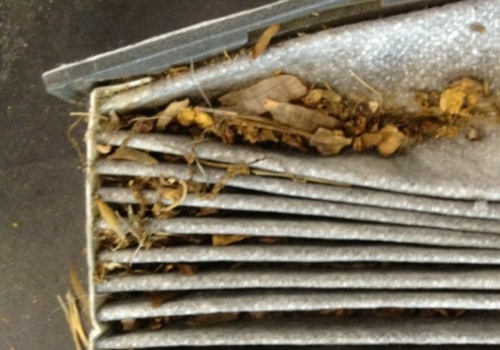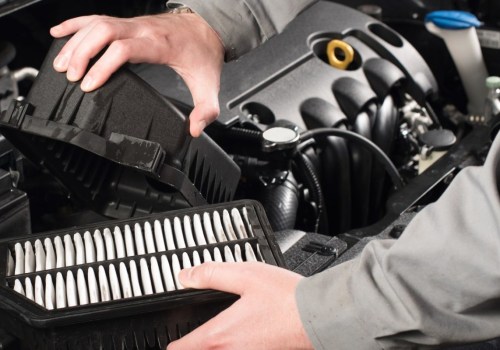Standard Home Furnace AC Filter Sizes
Are you struggling to find the right size filter for your home furnace AC unit? Choosing the correct filter size is crucial for optimal performance. We will guide you through common standard home furnace AC filter sizes, how to measure your current filter, and tips for selecting the perfect fit. Discover the importance of regular replacements and the benefits of high-quality filters. Let's help you find the ideal filter for your heating and cooling needs!
Importance of Choosing the Right Size Filter
Make sure you're selecting the correct size filter for your home furnace and AC unit to ensure optimal performance. Choosing the right size filter is crucial for maintaining filter efficiency, which not only helps in saving energy but also extends the lifespan of your HVAC system. When the filter fits properly, it can trap more dust, dirt, pollen, and other particles effectively. This leads to improved air quality in your home, reducing allergens and potential health risks.
Using a filter that is too small can result in unfiltered air circulating through your system, decreasing its efficiency and causing it to work harder than necessary. On the other hand, using a filter that is too large may not fit correctly and could allow debris to bypass the filtration system altogether.
Common Standard Sizes for Home Furnace AC Filters
When selecting air filters for your home furnace and AC system, it's crucial to know the common standard sizes available. The key sizes you should be familiar with are 16x20x1, 20x25x1, 14x20x1, and 16x25x1. By understanding these dimensions, you can ensure that you pick the right filter for optimal performance in maintaining air quality and system efficiency.
16x20x1
The 16x20x1 filter size is commonly used in residential HVAC systems. When choosing filters for your home furnace or AC unit, it's crucial to consider filter efficiency. A filter with a rating of MERV 8 or higher is recommended to effectively capture dust, pollen, and other airborne particles. The 16x20x1 size provides a good balance between airflow and filtration capacity in most standard systems. Remember to check the manufacturer's recommendations for your specific HVAC system before purchasing filters. Regularly replacing your 16x20x1 filter will not only improve indoor air quality but also help maintain the efficiency and longevity of your heating and cooling equipment.
20x25x1
One commonly used filter size for residential HVAC systems is 20x25x1, offering a balance between airflow and filtration capacity. When choosing filters for your system, consider the MERV rating to ensure efficient air quality control. Regular filter maintenance is crucial to keep your HVAC system running smoothly. With the 20x25x1 size, you get a good combination of capturing particles like dust, pollen, and pet dander while allowing adequate airflow through your system. Remember to check and replace your filters regularly according to manufacturer recommendations to prevent clogs and maintain optimal performance. By staying on top of filter maintenance with the 20x25x1 size, you can enjoy cleaner indoor air and extend the lifespan of your HVAC equipment.
14x20x1
Make sure you consider the dimensions of your HVAC system when selecting an appropriate filter size like 14x20x1 to maintain efficient airflow and filtration. Choosing filters that fit correctly is crucial for optimal performance. When it comes to maintenance tips, remember to check your filter regularly, ideally every 1-3 months, depending on usage. A clogged or dirty filter can reduce airflow and strain your system, leading to potential issues down the line. Additionally, when replacing the filter, make sure the arrow indicating the airflow direction is facing toward the blower motor. This simple step ensures the proper functioning of your HVAC system and helps extend its lifespan while keeping your indoor air clean and healthy.
16x25x1
Ensure you measure the dimensions of your HVAC system accurately to determine if an 16x25x1 filter size is compatible with efficient airflow and filtration. Opting for a filter with high efficiency can improve air quality by trapping more particles, dust, and allergens. The replacement frequency of the 16x25x1 filter should be considered to maintain optimal performance. Regularly changing filters not only ensures clean air but also promotes energy efficiency by preventing the system from overworking due to clogged filters. While initial costs may vary, investing in a quality 16x25x1 filter can lead to long-term cost savings through improved energy efficiency and fewer repairs. Prioritize both filter efficiency and replacement frequency for a healthy environment and efficient HVAC operation.
How to Measure Your Current Filter
To measure your current filter, start by locating the dimensions on the frame. Measuring accuracy is crucial to ensure you purchase the right replacement filter for your home furnace or AC unit. Use a tape measure to determine the length, width, and thickness of your existing filter. Make sure to note down these measurements accurately as even small variations can affect filter compatibility.
Once you have the dimensions, compare them with standard sizes available in stores or online. Filters are typically labeled with their size on the frame itself. If you cannot find an exact match, opt for a slightly smaller size rather than larger to prevent gaps that could let unfiltered air pass through.
When shopping for a new filter, consider factors like MERV rating and material type in addition to size. Choosing a high-quality filter that fits properly will help maintain good air quality in your home while keeping your HVAC system running efficiently.
Tips for Determining the Right Size Filter for Your Unit
When looking for the correct filter size, remember that even small variations in measurements can impact compatibility with your HVAC system. Ensuring measuring accuracy is crucial to prevent issues down the line. A filter that is too large may not fit properly, leading to air leaks and decreased efficiency. On the other hand, a filter that is too small can allow dust and debris to bypass the filtration system, reducing indoor air quality.
It's important to note that using the right filter size not only affects compatibility but also influences the filter lifespan. A filter that fits correctly will function efficiently, trapping pollutants and extending its longevity. Conversely, an ill-fitting filter may become clogged sooner due to inadequate coverage or strain on the HVAC system.
Importance of Regular Filter Replacement
Maintaining a consistent schedule for replacing your filters is crucial in ensuring optimal air quality and system efficiency. The filter lifespan and replacement frequency are key factors that directly impact the air quality in your home. Filters have different lifespans depending on the type and brand, but a general rule of thumb is to replace them every 1-3 months. By staying on top of this maintenance task, you not only improve the air quality but also reap health benefits. Clean filters help reduce dust, pollen, mold spores, and other allergens circulating in your home, which can alleviate allergies and respiratory issues.
Regularly changing your filters also contributes to the overall efficiency of your HVAC system. Clogged or dirty filters force the system to work harder to push air through, leading to increased energy consumption and potential damage over time. By keeping up with filter replacements, you ensure that your system operates smoothly while saving money on energy bills in the long run. Prioritize this simple yet impactful task for cleaner air and better system performance.
Benefits of Using High-Quality Filters
Investing in high-quality filters for your HVAC system can significantly enhance air purification and energy efficiency. When considering filter efficiency, high-quality filters are designed to capture a higher percentage of airborne particles like dust, pollen, and pet dander compared to standard filters. While the initial cost might be slightly higher, the long-term benefits outweigh the expense. In a cost comparison over time, high-quality filters often prove to be more economical due to their longevity and effectiveness.
Moreover, opting for high-quality filters not only improves indoor air quality but also has a positive impact on energy efficiency. These filters allow your HVAC system to operate more smoothly by reducing airflow restrictions caused by dirt buildup. As a result, your system doesn't have to work as hard to maintain the desired temperature in your home, leading to potential energy savings.
In addition to these advantages, choosing high-quality filters is also beneficial for the environment. By capturing more pollutants and extending the lifespan of your HVAC system, you are reducing waste and promoting sustainability in your household.
Finding the Right Filter for Your Home Heating and Cooling Needs
When choosing a filter for your home heating and cooling system, make sure to consider factors like size, efficiency, and compatibility with your HVAC unit. Filter efficiency is crucial as it determines how well the filter can trap particles like dust, pollen, and pet dander. Ensure you select a filter that matches the sizing requirements of your HVAC unit to prevent air leaks and maintain optimal performance.
Filter material also plays a significant role in its lifespan. Filters made from pleated fabric or electrostatic materials tend to last longer compared to fiberglass filters. These materials are more durable and efficient at capturing airborne particles. Remember to check the manufacturer's recommendations for when to replace your filter based on its lifespan.
Frequently Asked Questions
Can using the wrong size filter cause damage to my furnace or air conditioning unit?
Using the wrong size filter can restrict airflow, causing strain on your furnace or AC unit. This can lead to decreased efficiency, increased energy consumption, and potential damage over time. Make sure to use the correct size for optimal performance.
Are there any advantages to using a filter that is slightly larger or smaller than the recommended size?
Using a slightly larger filter can improve efficiency by capturing more particles. However, a smaller filter can restrict airflow, leading to strain on your system. Stick to the recommended size for optimal performance.
How often should I check and change my filter if I have pets in the home?
Check and change your filter every 30 days if you have pets in the home. Pet hair can quickly clog filters, reducing efficiency and causing strain on your system. Regular maintenance is crucial for optimal performance and to minimize allergies from pollen buildup.
Are there any specific brands or types of filters that work best for homes with allergies or asthma?
For homes with allergies or asthma, consider high-efficiency filters like HEPA or MERV 13. These filters can capture more allergens and pollutants. Remember to check and change your filter regularly for optimal performance.
Is it necessary to consult a professional HVAC technician when choosing a filter size for my unit?
When choosing a filter size for your unit, it is recommended to consult a professional HVAC technician. DIY filter sizing can have consequences on the efficiency of your system. Professional guidance ensures the right fit for optimal performance.
Here is the nearest branch location serving the Jensen Beach FL area…
Filterbuy HVAC Solutions - West Palm Beach FL
1655 Palm Beach Lakes Blvd ste 1005, West Palm Beach, FL 33401, United States
(561) 448-3760
https://maps.app.goo.gl/BP8p8pLU5n7w5nnFA
Here are driving directions to the nearest branch location serving Jensen Beach…



